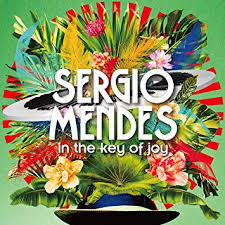Still, In the Key of Joy, a fresh documentary from director John Scheinfeld (Chasing Trane), brings the savvy Mendes into current focus, as does a double album of the same name. While the package’s second disc features radio-friendly Brasil ’66 hits of yore such as “The Look of Love” and “The Frog,” its first disc is all new, and keenly nuanced, even as its overall tone will feel familiar to Men
It gets off to a weird start, though, as “Sabor Do Rio” and the collection’s title tune host oddly rigid Chicago rappers Common and Buddy (respectively). Perhaps welcoming MCs whose voices were more fluid and whose lyrics felt fresher would’ve allowed these songs a freer vibe. Yet the basis of each track’s buoyancy, its merry carnival mien, stems from literal bells and whistles, to say nothing of an undulating indigenous percussive roll and the plush choral blend of female voices that’s made Mendes famous. The squeak of the cuíca that nestled below the groove of “Sabor Do Rio” is all but a third voice on the spidery “Bora Lá,” which intertwines the vocals of Mendes’ missus Gracinha Leporace and latter-day samba sensation Rogê.
The present and future of Brazilian music is secure in the hands of players such as Rogê and electronic composer Mika Mutti, whose moody “Romance in Copacabana” gives Mendes his hottest shot at showing off his fast and furious jazz piano skills. That Leporace appears, however, with fellow Brazilian music legends bossa pianist João Donato (on the bubbling “Muganga,” which he co-wrote) and samba guitarist Guinga (on the haunting “Tangara,” which he penned) allows Mendes to act as both studious curator and participant in the presentation of his life and music as a personal and aesthetic continuum. And that’s the true key to his Joy.














 At 78, Brazilian-born pianist, composer, and arranger Sérgio Mendes just might be ready for his closeup. Don’t get me wrong; Mendes has been a face for the breezily sophisticated sounds of Brazil ever since he departed from his mentor Antônio Carlos Jobim and brought jazzy bossa nova into 1960s AM radio-pop prominence. If you’re older than a minute, you’ll remember that there was once no medium where you couldn’t see Mendes’ big eyes and snazzy suits as he played beside the members of his Brasil ’66 ensemble (including Lani Hall, an airily cooing vocalist who became Herb Alpert’s wife), or hear his smoothly ethnic rhythms and chord changes—the cosmopolitan equivalent of Bacharach, Brian Wilson, and the Beatles. And beyond the ’60s, Mendes continued to make his mark, particularly with the pop-culture ubiquity of his breakthrough hit “Mas Que Nada,” the neo-soul/hip-hop-filled Timeless of 2006, and a 2012 Best Song Oscar nom for “Real in Rio” from the animated film Rio.
At 78, Brazilian-born pianist, composer, and arranger Sérgio Mendes just might be ready for his closeup. Don’t get me wrong; Mendes has been a face for the breezily sophisticated sounds of Brazil ever since he departed from his mentor Antônio Carlos Jobim and brought jazzy bossa nova into 1960s AM radio-pop prominence. If you’re older than a minute, you’ll remember that there was once no medium where you couldn’t see Mendes’ big eyes and snazzy suits as he played beside the members of his Brasil ’66 ensemble (including Lani Hall, an airily cooing vocalist who became Herb Alpert’s wife), or hear his smoothly ethnic rhythms and chord changes—the cosmopolitan equivalent of Bacharach, Brian Wilson, and the Beatles. And beyond the ’60s, Mendes continued to make his mark, particularly with the pop-culture ubiquity of his breakthrough hit “Mas Que Nada,” the neo-soul/hip-hop-filled Timeless of 2006, and a 2012 Best Song Oscar nom for “Real in Rio” from the animated film Rio.
 The VOCAL SOUND OF JAZZ began airing on 89.5 FM (now WHRV-FM) on January 4th 1980. Originally a 30 minute program that aired on Friday evenings, the program expanded to it current 60 minute format and moved to Saturday evenings during the 90s. It was also aired over WUOM in Ann Arbor, Michigan for a five-year period in the late 1980s.
Produced and hosted by Jack Frieden since its premiere broadcast, the program has always attempted to spotlight both jazz vocal music’s post 1950s history, as well as the new singers and songs that will continue to play an increasingly prominent role in the music’s future. With the internet’s ability to attract and entertain jazz vocal fans globally, Jack looks forward to broadening the mission and reach of the “Vocal Sound of Jazz” in coming years.
Email Jack Frieden
Vocal Sound of Jazz LLC
1056 Downshire Chase
Virginia Beach, Va. 23452
Ph: 757 438 6785
The VOCAL SOUND OF JAZZ began airing on 89.5 FM (now WHRV-FM) on January 4th 1980. Originally a 30 minute program that aired on Friday evenings, the program expanded to it current 60 minute format and moved to Saturday evenings during the 90s. It was also aired over WUOM in Ann Arbor, Michigan for a five-year period in the late 1980s.
Produced and hosted by Jack Frieden since its premiere broadcast, the program has always attempted to spotlight both jazz vocal music’s post 1950s history, as well as the new singers and songs that will continue to play an increasingly prominent role in the music’s future. With the internet’s ability to attract and entertain jazz vocal fans globally, Jack looks forward to broadening the mission and reach of the “Vocal Sound of Jazz” in coming years.
Email Jack Frieden
Vocal Sound of Jazz LLC
1056 Downshire Chase
Virginia Beach, Va. 23452
Ph: 757 438 6785